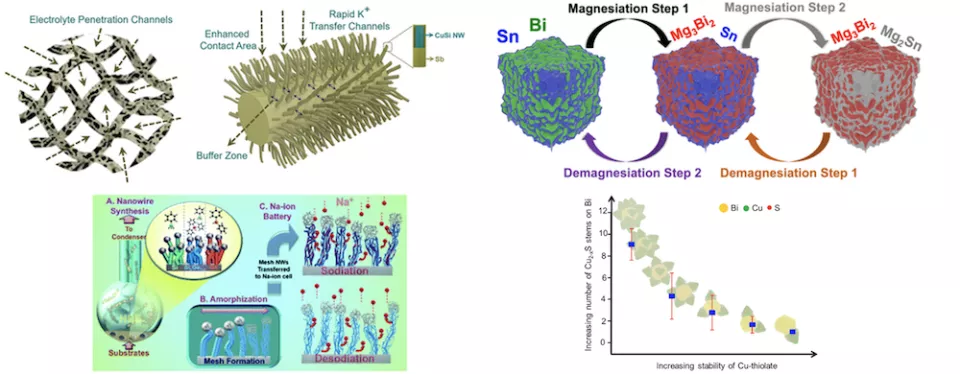This research seeks sustainable and low-cost battery chemistries for important applications such as grid-scale energy storage of renewable energy. The focus of this theme is on abundant elements such as Na-ion, K-ion and Mg-ion. Additional investigations include redox flow batteries for large scale energy storage.

Lithium is the basis of the modern battery revolution and is used in devices from mobile applications, to EVs and stationary storage. However, Li is a limited resource as is unlikely to be able to continue to power all of these devices into the future as renewable energy ramps up. As a result, non-Li based batteries have been gaining significant attention in the form of Na-ion, K-ion and Mg-ionamong others. In AMPEiRE, we use significant materials synthesis expertise to develop high performance active materials for non-Li based batteries. These efforts have included alloying materials for Na-ion, K-ion and Mg-ion batteries, with a focus on bottom-up grown nanomaterials and deep mechanistic understanding. AMPEiRE researchers have coordinated large-scale research projects in this field including Trident (https://www.linkedin.com/in/trident-project-8b7050231/).
Research outputs
'Directly Deposited Antimony on a Copper Silicide Nanowire Array as a High-Performance Potassium-Ion Battery Anode with a Long Cycle Life' Advanced Functional Materials, 2022 https://doi.org/10.1002/adfm.202209566
'Enhancing Magnesium-Ion Storage in a Bi–Sn Anode through Dual-Phase Engineering' ACS Applied Materials & Interfaces, 2024 https://doi.org/10.1021/acsami.4c11272
- 'Amorphization driven Na-alloying in SixGe1−x alloy nanowires for Na-ion batteries' Journal of Materials Chemistry, 2021 https://doi.org/10.1039/D1TA03741B
'Multipod Bi(Cu2-xS)n Nanocrystals formed by Dynamic Cation–Ligand Complexation and Their Use as Anodes for Potassium-Ion Batteries' Nano Letters, 2022 https://doi.org/10.1021/acs.nanolett.2c03933